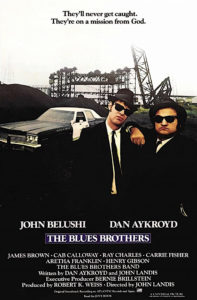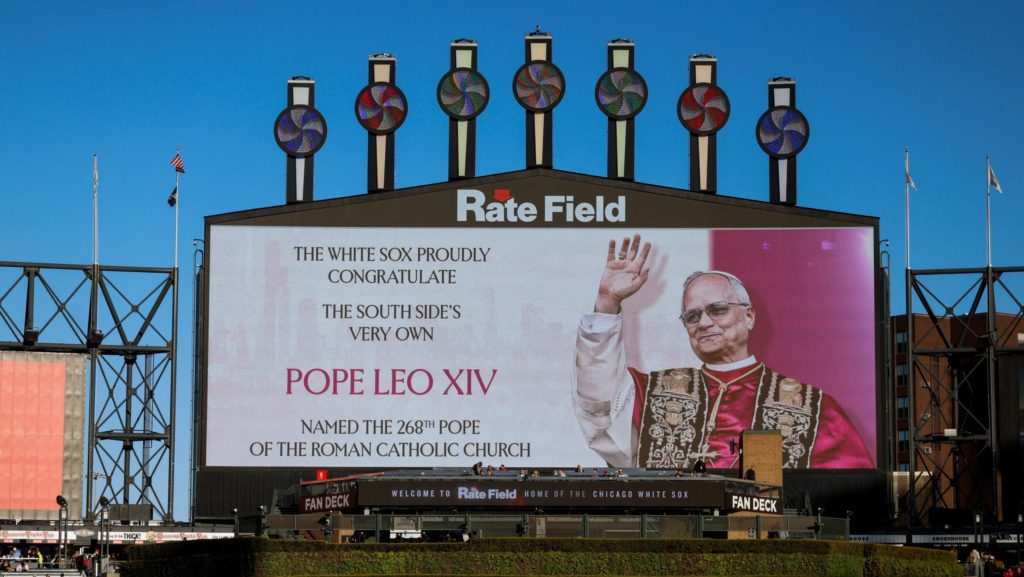Pope Leo XIV is our first American pope, which is too broad an achievement to inspire much excitement. It’s far more precise to say he’s the first pope from Chicago; from this we can surmise he’s also the first pope to properly understand the majesty of Michael Jordan, as well as the first pontiff in 500 years of Italians to mistake lasagna for pizza.
If you dragged America over the European subcontinent, placing Los Angeles at about Madrid, the Windy City would sit somewhere on the Ukrainian front. Such geographical and cultural distance might make it difficult to relate to our new Holy Father, so I thought I’d provide something of a syllabus to help us understand him and his Midwestern origins. Here are five films to properly understand Chicago, and our pope’s place within it.
“Eight Men Out” (1988)
Then-Cardinal Robert Prevost was such a dark horse in this conclave that much of him remains a mystery, particularly where he stands on some “hot-button issues.” But his brother helped clear up at least one pressing matter, insisting that contrary to prior reports, Leo supports the Chicago White Sox. You can learn more about a man from his sports fandom than his taxes, which is why I encourage you to watch the John Sayles film “Eight Men Out.”
Following the 1919 Black Sox scandal, where players threw the World Series in exchange for money, this film captures a moment some 35 years before Leo’s birth. But fandom is an inheritance not dissimilar to our own from Adam; as Bruce Springsteen once put it, “You’re born into this life paying/for the sins of somebody else’s past.”
The original sin of the Black Sox scandal was owner greed crunching the players down to a state where they were willing to corrupt themselves and the game. The downstream ills of capitalism and its effect on the workers were important to the former Leo XIII, and clearly to our own, as he designated himself his successor.
“A Raisin in the Sun” (1961)
If his White Sox fandom didn’t already attest, Leo grew up on the South Side of Chicago. Perhaps best known from cable news and your uncle’s Facebook posts, the South Side is a rough-and-tumble neighborhood, as well as one of the more deeply segregated in the country. Leo’s father was white but his mother was Louisiana Creole, her family coming to Chicago alongside millions of others during the Great Migration.
“A Raisin in the Sun,” based on the Lorraine Hansberry play, follows a more uniformly black but contemporaneous family in the South Side. They struggle against prejudice, bad decisions, and worse luck to snag a scrap of the American Dream, all while wondering if it’s the destination or the dream itself that keeps them going. Since the future pope’s X account expressed support for the George Floyd protests, “A Raisin in the Sun” helps illuminate how close to home this cause is, in more ways than one.

“The Blues Brothers” (1980)
This is the only film on this list I can say with certainty that the pope has seen (aside from “Conclave,” which the pope’s brother confirmed he watched). That’s because at the time it came out, viewing “The Blues Brothers” was legally required for all Chicago residents under the age of 35.
The effects on him are unmistakable: Leo is also in favor of saving Catholic orphanages from foreclosure and he appears to hate Illinois Nazis, along with Nazis from other states and nationalities. We have no word yet on his thoughts on country or western music.
“While You Were Sleeping” (1995)
The only formal cinematic endorsement we have from Leo is a retweeted list of Christmas movies compiled by Catholic News Service media reviewer John Mulderig. The only Chicago set films on that list are “Christmas with the Kranks” and “Fred Claus.” With respect to papal infallibility and the dignity of the office, I cannot in good conscience endorse either of those.
What I instead recommend is “While You Were Sleeping.” It follows the story of a lonely Chicago Transit worker (Sandra Bullock) who, through a series of miscommunications, accidentally convinces the family of the [now coma-induced] man she rescued from the tracks that she is his fiancée. It’s an outlandish premise that settles into something fuzzy and Irish as the family drags her into their Christmas celebrations, and by consequence, their love. It’s a far more ground-level view of Chicagoans, and a more mature view of Catholicism in America. Too many films portray Catholics as either entirely lapsed or devout beyond recognition. “While You Were Sleeping” recognizes the elasticity, where people are forgiving of themselves until circumstances pull them to attention.
“Return To Me” (2000)
“Return To Me” is directed, written, and co-starred in by Bonnie Hunt, who was once very nice to me in our one interaction. I doubt she remembers this; the creative voice behind such a kind movie is likely kind to everyone. Chicago construction manager Bob (David Duchovny) is a recent widow who finally starts to open up again around waitress Grace (Minnie Driver) who, through some cosmic joke, is the unbeknownst recipient of his dead wife’s heart.
Once more a ridiculous premise, but the skill comes in at its most subtle moments, as Grace and her extended Catholic clan provide the support system for Bob to find his way back to life. Its very midwestern Catholicism reminds me of much of the current tone of Leo himself. Steadfast but not prescriptive, aspirational but honest. The characters of “Return To Me” mean well, and not in the current fashionable sense of the term where that merely means feeling guilty as you persist anyway. Here they try, they fail, they try again, only to learn they were in on the cosmic joke all along.

